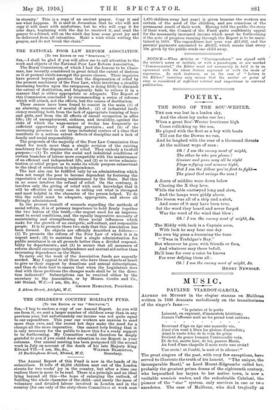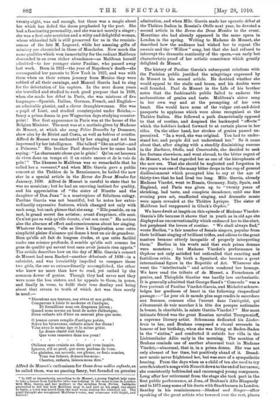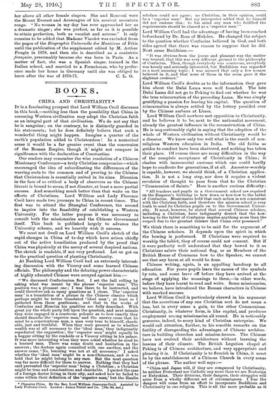M USIC.
PAULINE VIARDOT-GARCIA.
ALFRED DE MUSSET in the elegiac stanzas on Malibran written in 1836 descants melodiously on the transitoriness of the singer's fame :— " le peintre et le poste Laissent, en expirant, d'immortels hiritiers;
Jamais l'affreuse nuit no les prend tout entiers: Recevant d'Age en Age une nouvelle vie, Ainsi s'en vont D. Dieu lea gloires d'autrefois ; Ainsi le yaste echo de la voix du genie Devient du genre humain l'universelle voix. Et do toi, morte hier, de toi, pauvre Marie, Au fond d'une chapelle it nous rests une croix I
Tine croix ! et l'oubli, In nuit et le silence ! "
The great singers of the past, with very few exceptions, have served to illustrate the truth of his lament. " The unique, the incomparable Banti," as Lord Mount-Edgcumbe called her,
probably the greatest prima donna of the eighteenth century, who bequeathed her larynx to her native town, is now a
veritable nominis umbra, and the redoubtable Catalani, the pioneer of the " star " system, only survives in one or two
anecdotes. The case of Malibran, who died tragically at twenty-eight, was sad enough, but there was a magic about her which has defied the doom prophesied by the poet. She had a fascinating personality, and she was not merely a singer ; she was a first-rate musician and a witty and delightful woman, whose whimsical talk is still preserved for us in the reminis- cences of the late M. Legouve, while her amazing gifts of mimicry are chronicled in those of Moscheles. Now much the same qualities which won immortality for the radiant Malibran descended in an even richer abundance—as Malibran herself admitted—to her younger sister Pauline, who passed away last week. Born in 1821—the year of Napoleon's death—she accompanied her parents to New York in 1825, and was with them when on their return journey from Mexico they were robbed of all their earnings, and Manuel Garcia had to sing for the delectation of his captors. In the next dozen years she travelled and studied to such good purpose that in 1838,
when she made her debut in Paris, she was mistress of five languages—Spanish, Italian, German, French, and English—
an admirable pianist, and a clever draughtswoman. She was a pupil of Liszt, and studied counterpoint under Reicha,— fancy a prima donna in pm-Wagnerian days studying counter- point ! Her first appearance in Paris was at the house of the Belgian Minister. The next was at a matinee given by Madame
de Musset, at which she sang Felice Donzella by Dessauer, show airs by de Beriot and Costa, as well as boleros et ariettes. Alfred de Musset was enchanted by her singing and not less
impressed by her intelligence. She talked " like an artist—and a Princess." His brother Paul describes how he came back saying : "La charmante chose que le genie ! Qn'on est heureux de vivre dans un temps oil il en exists encore et de le voir de
pres ! " The likeness to Malibran was so remarkable that he called her a revenant,* and when Mlle. Garcia gave a public concert at the Thatre de la Renaissance, he hailed the new star in a special article in the Revue des Deux Mondes for January, 1839. Alfred de Musset is careful to state that he was no musician ; but he had an unerring instinct for quality,
and his appreciation of " the sister of Ninette and the daughter of Don Juan" is a masterpiece of felicitous eulogy. Pauline Garcia was not beautiful, but he notes her extra- ordinarily expressive features, which changed not only with each song, but each phrase that she sang. " Elle pomade, en un mot, le grand secret des artistes ; avant d'exprimer, elle sent. Ce n'est pas sa your qu'elle ecoute, c'est son ocean" He notices also the absence of effort and consciousness about her singing.
Whatever the music, " elle se livre g l'inspiration avec cette simplicite pleine d'aisance qui donne a tout un air de grandeur. Bien qu'elle ait fait de longues etudes, et que cette facilite cache une science profonde, it semble qu'elle soit comme les gene de quality qui savent tout sans avoir jamais rien appria."
The article describes how on the day of Mlle. Garcia's concert
de Musset had seen Rachel—another debutante of 1838—in a cabriolet, and was irresistibly impelled to compare these two girls, the one so extraordinarily accomplished, the other who knew no more than how to read, yet united by the common dower of genius. Though they had never met they
were none the less sisters, and he appeals to them, in prose, and finally in verse, to fulfil their true destiny and bring about that return to truth of which Art was then sorely in need :—
"Disentons nos travers, nos raves et nos goats, Comparons loisir le moderne et l'antique, Et ferraillons sous ces drapeaux jalonx ; Quand nous serous an bout de notre rhetorique, Deux enfants nes d'hier en sauront plus que nous.
0 jeunes ccenrs remplis d'antique poesie, Soyez les bienvenus, enfants aim% des dieux ! Vous ayes le mime Age et le meme genie.
La douce chute soit Mule
Que vous ramenez dans nos yeux !
• • Obeissez sans crainte an dies qui vons inspire. Ignorer, s'il se pent, que nous parlous de vons. Ces *Antes, ces accords, ces pleura, ce frais sourire, Tons yes tresors, donnez-les-nous Chanter, enfants, laissez-noun dire."
Alfred de Mussel's enthusiasm for these dear nobles enfants, as
he called them, was no passing fancy, but founded on genuine
* In issv or thereabouts, according to de 24 asset, a young English lady came to take a lesson from Lablache (who was lodging in the same house in London with Mlle. Garcia and her mother) in the cavntina from Nemo. Lablaehe proceeded to tell her how Malibran sang it, and just as his pupil was about to begin, a voice was beard from the next room singing the identical air. The pupil thought she recognised Malibran's voice, was overcome with fright, and fainted 1 admiration, and when Mlle. Garcia made her operatic debut at the Theitre Italian in Rossini's Otello next year, he devoted a second article in the Revue des Dew Mondes to the event. Meantime she had already appeared in the same opera in London in the spring. Writing to Madame de Musset, she described how the audience had wished her to repeat Che smania and the " Willow " song, but that she had refused to interrupt the dramatic continuity of the opera,—an early but characteristic proof of her artistic conscience which greatly delighted de Musset.
The history of Pauline Gareia's subsequent relations with the Parisian public justified the misgivings expressed by de Mussel in his second article. He doubted whether she would appeal to the stalls and boxes, and his doubts were well founded. Paul de Musset in the Life of his brother notes that the fashionable public failed to endorse the acclamations of genius and taste. Malibran's sister sang in her own way and at the prompting of her own heart. She would have none of the vulgar cut-and-dried passports to applause which were alone recognised at the Theatre Italien. She followed a path diametrically opposed to that of routine, and despised the hackneyed " effects " which the habitues looked forward to at certain places in her roles. On the other hand, her strokes of genius passed un- perceived. " In a word, she was original. You had to under- stand her, and people did not understand her." So it came about that, after singing with a steadily diminishing success in the Barbiere, Otello, 'and Cener entola, she decided to seek her fortune elsewhere, and went abroad, to the bitter regret of de Musset, who had regarded her as one of the hierophants of the new era. That she should be neglected and forgotten in two years was one of the many bitter drops in the cup of general disillusionment which prompted him to say at the age of thirty-two that he had lived too long. Mlle. Garcia, already Madame Viardot, went to Russia, Germany, Italy, Spain, and England, and Paris was given up to " twenty years of shrieking, bad taste, and complete decadence, until one fine evening pure art, unaffected singing, and dramatic music were again revealed at the Theiltre Lyrique. The sister of Malibran had reappeared in Gluck's Orphee."
We have dwelt at lengtkon-this episode of Madame Viardot- Garcia's life because it shows that in youth as in old age she displayed an unconventionality which endeared her to the elect, but perplexed the lovers of routine. " We shall always find," wrote Berlioz, " a fair number of female singers, popular from their brilliant singing of brilliant trifles, and odious to the great masters because utterly incapable of properly interpreting them." Berlioz in his wrath said that such prima donnas were monsters ; but Madame Viardot's performance in Orpheus not only satisfied but enthralled that exacting and fastidious critic. By birth a Spaniard, she became a great international figure in the Republic of Art. Wherever she went the " intellectuals " and artists rendered her homage. We have read the tribute of de Musset, a Frenchman of genius, and Theophile Gautier was hardly less enthusiastic. It is generally admitted that George Sand's " Consuelo " was a free portrait of Pauline Viardot-Garcia, and Michelet acknow- ledges her goodness of heart in the following rhapsodical passage :—" Le jour oil le monde plus sage rendre le sacerdoce aux femmes, commes elles l'eurent dans l'antiquite, qui s'itonnerait de voir marcher a, la tete des pompes nationales la bonne, la charitable, la sainte Garcia-Viardot ? " Her most intimate friend was the great Russian novelist Tourguenieff, a supreme literary artist. Schumann dedicated his Lieder- kreis to her, and Brahma composed a choral serenade in honour of her birthday, when she was living at Baden-Baden in the " sixties," and condOtted it outside her villa in the Lichtenthaler All& early in the morning. The mention of Brahms reminds one of another abnormal trait in Madame Viardot,—abnormal, that is, in a prima donna. She was not only abreast of her time, lint positively ahead of it. Brand- nevi music never frightened her, but was sure of a sympathetic hearing. From the days when as a child of ten she used to try over Schubert's songs with Nourrit dowii to the end of her career, she consistently befriended and encouraged young composers. Long after' her retirement from the stage she took part in the first public performance, at Jena, of Brahms's Alto Rhapsody and in 1871 sang some of his duets with Stockhausen in London. Bentley in his reminiscences—Student and Singer—after speaking of the great artists who towered over the rest, places her above all other female singers. She and Ronconi were the Mount Everest and Aconcagua of his musical mountain range. " No woman in my day has ever approached her as a dramatic singer ; she was perfect, as far as it is possible to attain perfection, both as vocalist and actress." It only remains to be added that Madame Viardot was excluded from the pages of the Biographie Universelle des Musiciens of Fetis until the publication of the supplement edited by M. Arthur Pougin in 1878, and then she is described as a cantatrice francaise, presumably because she was born in Paris. As a matter of fact, she was a Spanish singer, trained in the Italian school, and married to a Frenchman, who by prefer- ence made her home in Germany until she was obliged to
leave after the war of 1870-71. C. L. G.
















































 Previous page
Previous page